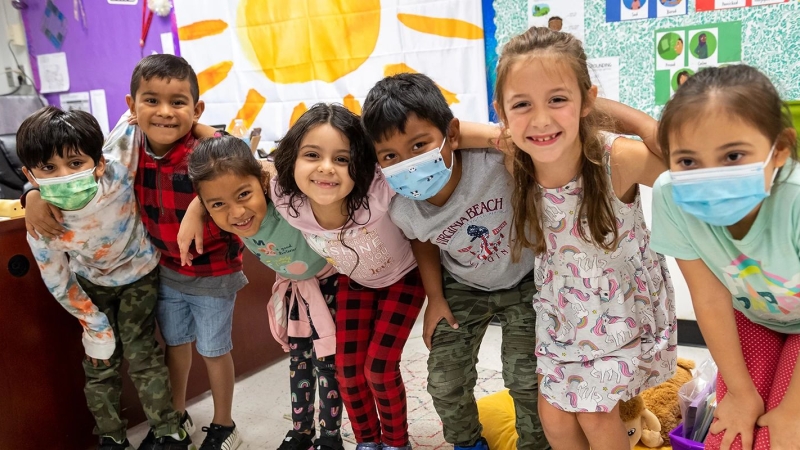Program Profile: School Psychology Services
Details and data for the 2023-24 School Year
Program Overview
The Office of School Psychology Services provides coordinated, comprehensive, and culturally responsive mental health services designed to eliminate barriers to students’ learning in the educational setting. The mission of the Office of School Psychology Services is to promote the academic, social, and emotional development of all students by providing mental health services that build resilience and life competencies and empower students to be responsible and innovative global citizens.
School psychologists partner with staff and families to ensure that all students achieve academically, show positive and prosocial behaviors, and are mentally healthy. The School Psychology program adheres to the ethical standards of practice outlined by the American Psychological Association (APA) and the National Association of School Psychologists (NASP). The Office of School Psychology Services follows the NASP Model for comprehensive and Integrated School Psychological Services, which emphasizes delivery of coordinated, evidence-based services in a professional climate by appropriately trained and ethically practicing school psychologists who receive regular supervision and continuous professional development.
In 2017 our country’s youth ranked in the bottom third of developed nations on the Global Youth Wellbeing Index. According to a 2019 report by the Centers for Disease Control and Prevention (CDC), Attention-Deficit/Hyperactivity Disorder (ADHD), anxiety, depression, and disruptive behavior disorders are the most diagnosed mental health conditions in children. These conditions often lead to a lack of engagement in class, low academic achievement, absenteeism, disruptive behavior, risk-taking behaviors, and/or dropping out of school. Results from the 2022-23 Fairfax County Youth Survey (FCYS) show that almost one fourth of the students (23.5%) reported experiencing stress for most or all of the past month, and over half (50.7%) reported experiencing stress for a little or some of the past month. Levels of stress increased with grade level, ranging from over one sixth of the eighth-grade students (17.3%) reporting feeling stressed most or all the time in the past month to almost a third of the twelfth-grade students (28.8%). Mental health problems can affect student learning and performance.
The Fairfax County Youth Survey highlights the value of protective factors in building resilience. School psychologists support the development of these protective factors in their direct service delivery to students and their consultative work. As a result of this work, students experience increased academic success, improved mental health, and greater resiliency. When schools provide students with effective social, emotional, and mental health support, it improves children’s lives. School psychologists play an important role in identifying emerging mental health conditions, providing services in the educational setting, and connecting students and families to support in the community.
School psychologists offer a broad range of prevention and intervention services to all Fairfax County Public Schools students, to include consultation, counseling, assessment, and crisis intervention . There is at least one school psychologist assigned to every school and special education program. School psychologists are also part of the Early Childhood Assessment Teams, conducting evaluations and providing consultation to parents and educators for children ages 2-5. School psychologists consult with school leadership and teachers, advancing sound instructional and behavioral practices that are provided to students across a multi-tiered system of supports (MTSS). School psychologists are critical members of problem-solving committees and teams, working to develop a comprehensive range of data-driven interventions for students demonstrating academic, social, emotional, and/or behavioral health concerns. School psychologists conduct assessments and collaborate with teachers to help develop plans to address behavioral and/or learning challenges. School psychologists serve on teams that consider eligibility for special education services and are identified as the team chairperson for initial eligibility meetings.
School psychologists provide direct services to students including individual and small group counseling and conduct risk assessments to address urgent needs involving threats of harm to self, others, and concerning behaviors. School psychologists intervene when students experience mental health issues that impact attendance, academic performance, and social interaction. These services enhance students’ thinking and social emotional skills.
School psychologists provide additional services to school and central office teams by leading training and initiatives on a wide variety of topics related to behavior, mental wellness, and social and emotional learning (SEL). At the central office level, school psychologists collaborate with other offices to guide division-level work around SEL, school refusal, risk assessment, functional behavior assessment and behavior intervention plans (FBA/BIP), trauma-sensitive school practices, equity and cultural responsiveness, Youth Mental Health First Aid, Teen Mental Health First Aid, the appropriate use of evidence-based programs, and crisis intervention using the nationally recognized PREPaRE training curriculum. Additionally, School Psychology Services supports the development of policies and regulations related to the areas noted above.
School Psychology Services collaborates with county agencies through the following partnerships: Successful Children and Youth Policy Team, Community Policy and Management Team, Children’s Behavioral Health Collaborative, and the Trauma Informed Community Network. In partnership with other offices and community-based organizations, our office shares presentations at events such as the FCPS Mental Health and Wellness Conference, the FCPS Special Education Conference, Virginia Department of Education conferences, and other functions.
The FCPS budget is supplemented by monies from Comprehensive Early Intervening Services (CEIS). Selected psychologists deliver evidence-based interventions for up to 20% of their time with the goal of preventing the need for special education referral and services. In addition, a part of the cost of counseling services required as a part of students’ individual education plans (IEP) is reimbursed for Medicaid eligible students.
Many school psychologists participate in advanced professional development opportunities as part of their commitment to furthering their knowledge of current best practices and continuously enhancing services to schools. In the past year, school psychologists participated in specialized training series on Dialectical Behavior Therapy led by Dr. Sarah Fischer of George Mason University (GMU); Trauma-Focused Cognitive Behavioral Therapy led by Dr. Alicia Meyer of Alicia’s Place; and Foundations of Group Counseling led by Dr. Ellen Rowe and Dr. Daniel Palmer of GMU.
View more information regarding services available from school psychologists
Recognizing school climate as a critical factor in promoting student achievement and creating a caring culture, school psychologists work with school leadership teams to implement school wide practices designed to improve school climate and cultivate a positive school culture. These practices include social and emotional learning, school wide positive behavior supports, mental wellness activities, crisis response planning and services, bullying prevention, and targeted efforts to improve student engagement and attendance. This ongoing, continuous assessment of school climate is important, as it is the foundation on which all other work is built. When evaluating the learning environment and individual students, school psychologists employ both formal and informal assessment methods.
As members of the MTSS problem-solving teams, school psychologists assist with data analysis and intervention design. School psychologists bring an awareness of the ways in which students' mental health, cultural background and life experiences influence assessment and intervention strategies, guiding the selection of culturally appropriate and trauma-informed interventions and services. Additionally, school psychologists support the development of assets that reduce the likelihood that students will engage in risk behaviors.
School psychologists serve on school teams that consider a student’s need for special education services. In this capacity, school psychologists may administer psychological assessments, which involve completing individually administered measures; classroom observations; and parent, teacher, and/or student interviews. Each year, school psychologists complete an average of over 6,000 psychological evaluations, with each evaluation taking an average of 14 hours. All formal assessment tools used by school psychologists have been thoroughly reviewed and approved by the FCPS Test Review and Approval Committee to ensure that they are psychometrically sound.
Psychological assessment results are used in decision-making related to special education eligibility and inform instructional planning. The school psychologist serves as the chair of the special education initial eligibility committee and as a member of the Section 504 eligibility committee. The school psychologist is part of the IEP team when considering whether a student’s mental health needs are significant enough to warrant counseling as a related service, and as otherwise necessary. If counseling services are included on the IEP, the school psychologist is one of the approved providers of that service.
School psychologists facilitate FBA/BIP meetings and participate as required members of the FCPS Risk Prevention protocol for threats of harm to self, others and concerning behaviors. School psychologists serve on teams charged with developing transition plans for students returning to school following an extended absence for any reason. In addition, school psychologists support the implementation of SEL Universal Screener and work and collaborate with school teams to interpret results, match instruction, and monitor student progress.
School psychologists deliver direct services in classrooms, small groups, and individual settings. All materials used are from sources such as NASP and APA, and other approved developers and publishers. In addition, research-based materials and protocols are used in all aspects of our work, including wellness and SEL screening and risk prevention processes. Many school psychologists are certified crisis responders, having completed the nationally recognized PREPaRE crisis training program. Intervention programs implemented by school psychologists are approved by agencies such as SAMHSA and are listed on their Evidence-based Practices Resource Center. School psychologists have worked with Department of Defense School Liaison Officers from Fort Belvoir Military Installation to bring an Army-developed and sponsored Student Ambassador Program to elementary, middle, and high schools.
Selection of the individually administered assessments used in special education evaluation is determined by the referral concern and guided by the psychologist’s clinical judgment and knowledge. All individually administered, standardized measures go through a review and approval process, managed and led by the Office of School Psychology Services. This process determines which instruments are appropriate for use in the educational setting. Instruments reviewed include, but are not limited to, measures of cognitive functioning, social-emotional functioning, motor development, and speech and language development.
The current and future focus of our office is to provide services to FCPS students, families, and staff in support of the Strategic Plan. Emotionally healthy individuals are more available to actively participate in, and positively contribute to, their environment. The focus of our office is to contribute to the development of a healthy school climate and a culture of caring in all FCPS educational settings.
The Office of School Psychology Services has a well-developed and comprehensive service delivery model that is designed to meet the multiple and complex needs of students, families and school staff. Our plan has the Strategic Plan and Portrait of a Graduate (PoG) as the foundation for our work. Each school psychologist reviews the School Improvement and Innovation Plan (SIIP) for the schools they serve and then develops professional goals grounded in the broad goals of the Strategic Plan and PoG and tailors it specifically to the SIIP. The focus of the work may be at the systems level working to implement school-wide initiatives, at the classroom level providing instructional and behavioral consultation to teachers, or at the student level providing direct services to individual students. FCPS, along with federal, state and community agencies, utilizes a multi-tiered system of supports to ensure the provision of a continuum of services for mental health. School psychologists support this work across all tiers. Representatives from the Office of School Psychology Services serve on multiple committees involved in the Behavioral Health Systems of Care Blueprint, in collaboration with our county government colleagues. They partner in the trauma-informed care network and their training, which is available to FCPS employees, families, and community members and guide schools in their analysis, interpretation, and application of data collected from both the SEL Universal Screener and the Fairfax County Youth Survey.
The Office of School Psychology Services will continue to adhere to the NASP Model for Comprehensive and Integrated School Psychological Services. Central to this service delivery model is the provision of direct and indirect services to students and families across a multi-tiered system of support. We will maintain a continued focus on data-based decision making, using division, school, classroom, and individual student data to inform instruction and to create an educational environment that supports academic, social, and emotional learning and growth. School psychologists are and will continue to be involved in the implementation of universal screening practices and the expansion and utilization of a multi-tiered system of support for academics, behavior, and mental wellness.
School psychologists will continue to collaborate with school social workers and school counselors to expand and sustain Resiliency Project efforts, including bullying intervention and prevention, wellness screening and suicide awareness, Kognito, Youth and Teen Mental Health First Aid training, crisis intervention and postvention, and the provision of resources for parents and community members to help build resiliency in students. Collaborative training will be provided using the PREPaRE crisis response protocol, creating trauma-informed schools, supporting military-connected students and families, and other evidence-based interventions.
Increasing student participation and voice in mental wellness initiatives and information sharing will continue to be a focus for the Office of Psychology Services. In collaboration with other offices and student advocacy groups (i.e., the Superintendent’s Advisory Council; Our Minds Matter; etc.), staff will work to encourage active student engagement in increasing awareness of mental wellness, identifying protective factors and developmental assets that support wellbeing, and the reduction of stigma around mental illness. Ongoing projects related to school and community-based wellness messaging will continue and expand, to include a reorganization of wellness resources for staff, students and parents included on the FCPS public website and expansion of both YMHFA and tMHFA offerings across the division, and Health Minds News.
Professional development for educators is supported through the provision of ongoing Risk Prevention Training and the Mental Health in Schools academy course . Throughout the academic year, school mental health teams will expand social and emotional learning and wellness education in schools through increased student participation in educational activities such as anti-bullying, depression awareness, Our Minds Matter Clubs and the interpretation and use of SEL Universal Screener and Fairfax County Youth Survey data.
The information reported below represents a snapshot of services provided by school psychologists during the 22-23 SY . In addition to the services offered during the school year, many other services are offered each year during July and August. During these months, school psychologists manage Summer Clinic; provide mental health services to students receiving Extended School Year services; provide training to staff, students, parents, and community members; and offer Wellness Clinic. Wellness Clinic provides an opportunity for parents to receive guidance on how to support their students’ emotional well-being and offers support and strategies to students who are experiencing difficulties with anxiety, mood, behavior, or peer or family interactions. Information about community resources is also made available.
Summary of School Psychology Services Provided During 2022-2023 School Year
|
Service |
Number Conducted in 2022-2023 |
|---|---|
|
Teacher Consultations |
24,967 |
|
Parent Consultations |
7,507 |
|
Individual Counseling Sessions |
13,429 |
|
Classroom Interventions |
2,717 |
|
Psychological Evaluations |
6,532 |
|
MTSS meetings |
12,113 |
|
FBA/BIP Meetings |
2,037 |
|
504 Eligibility/Plan Meetings |
2,075 |
|
Consultation with Outside Providers |
2,075 |
Contact: Donna Desaulniers, [email protected]



